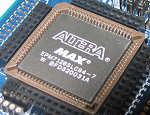 The Bureau of Industry and Security (BIS) released last week a Settlement Agreement with Enternet LLC, an Illinois-based manufacturer and distributor of collating and insertion systems for newspapers. According to the released documents, Enternet “releas[ed] technology for the development, production or use of a field programmable logic device, technology subject to the Regulations (ECCN 3E991), to an employee who was, at that time, a national of Iran” without the required license. A penalty of $7,000 was imposed. It does not appear that the violation was voluntarily disclosed.
The Bureau of Industry and Security (BIS) released last week a Settlement Agreement with Enternet LLC, an Illinois-based manufacturer and distributor of collating and insertion systems for newspapers. According to the released documents, Enternet “releas[ed] technology for the development, production or use of a field programmable logic device, technology subject to the Regulations (ECCN 3E991), to an employee who was, at that time, a national of Iran” without the required license. A penalty of $7,000 was imposed. It does not appear that the violation was voluntarily disclosed.
The device in question was most likely one of two sensors used by Enternet and that were described on its website:
Enternet’s Check One sensor, a positive logic infrared sensor, prevents human intervention or dirt from compromising the sensor’s purpose. And Enternet’s Cycle Sensor, also a positive logic device, enables phasing of the system to lock in on hopper adjustments before the hopper is required to feed, eliminating waste without operator intervention. Operating together, these two sensors permit the system to auto-learn and adjust for hopper drop locations.
The lesson here is that you can find export controlled technology in the most unlikely places. it is reasonable to suppose (particularly given the small fine) that Enternet didn’t know that these devices were export controlled. As a result, they wouldnt have know that they couldn’t provide information about the operation of those devices to an Iranian employee in the United States.
One important qualifications should be noted. The settlement documents don’t make clear that only certain field programmable logic devices are covered. Under ECCN 3A991 (to which ECCN 3E991 refers) covers only field programmable logic devices that have an equivalent gate count of more than 5000 (2 input gates) or a toggle frequency exceeding 100 MHz. I’m a bit surprised that these control sensors would have met those specifications, but they obviously must have, which is yet another reason that company engineers need to be conversant with the Commerce Control List.
Finally, when you click on the link to the Enternet documents on the BIS website, you will no doubt notice that the documents take quite some time to load. That’s because the file is more than 20 MB, which is much larger than needed for 11 pages. Recently, BIS has been posting these bloated documents instead of the much more streamlined documents that they had been posting previously. For example, another 11 page document, posted back in March of this year, was only 700 KB, almost thirty times smaller. Either BIS doesn’t want people looking at settlement agreements or they have a new person who doesn’t know how to scan the documents in properly. Since my money is on the latter possibility, I hope that they can fix this problem soon.
 Permalink
Permalink
Copyright © 2007 Clif Burns. All Rights Reserved.
(No republication, syndication or use permitted without my consent.)

 Posted by
Posted by  Category:
Category: 

